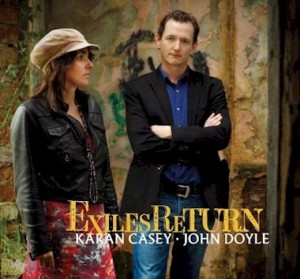 Immigration, whether now or in the 1840s, has always been a wrenching story. You can read all about it in the history books—or in today’s New York Times. But no medium has ever told the story better than a song.
Immigration, whether now or in the 1840s, has always been a wrenching story. You can read all about it in the history books—or in today’s New York Times. But no medium has ever told the story better than a song.
The new instant classic by Karan Casey and John Doyle, “Exiles Return,” is full of them. Not every tune, certainly, but more than half of the 12 tracks are sensitively rendered tales of loving, longing and leaving. We’re not talking about overexposed, overproduced tunes like “Isle of Hope, Isle of Tears,” either. It’s easy to trivialize the experience of leaving a land, and a lot of artists can’t resist the temptation. These are not the kinds of tunes that can easily be summed up, as Seamus Egan of Solas has put it, as “a story about a man, a woman and some farm animals, ending in disaster.”
“Exiles Return” is an altogether different type of album. It features traditional tunes like “Sally Grier,” “The Bay of Biscay,” “The Nightingale” and “The Flower of Finae,” along with a couple of more recent tunes, “The Shipyard Slips” by David Wilde and the title tune, “Exiles Return,” by Doyle himself. What makes the CD different is not so much the songs, although they’re all choice. Casey and Doyle, with some help from Michael McGoldrick on flute and whistle and producer Dirk Powell on banjo and double bass, have created an unembellished recording in which the pure emotion of the songs can be allowed to shine through. Probably the best example of that approach is Casey’s riveting unaccompanied performance of the tender love song “Out of the Window.”
“Unembellished” doesn’t mean “Exiles Return” is completely devoid of instrumentality. How disappointing that would be for fans of the great John Doyle! There’s probably no guitarist on the planet more consistently inventive and adventurous. Longtime Solas bassist Chico Huff, talking about accompanying Doyle, notes that he never plays the same thing twice. Every verse brings new layers and textures, new chord progressions, phrasing and licks. If you’re a Doyle devotee, you won’t be disappointed. His muscular strumming on the opening track, “The False Lady” and on “Madam I’m a Darlin'” show why Doyle is the standard against which all others are judged.
Karan Casey, who previously performed with Doyle in the Irish-American supergroup Solas, was simply born to sing these songs. Like Doyle, she’s one of a kind. No one sounds quite like her. Whether taking the lead or joining Doyle in harmonies—and there are many delicious harmonies on “Exiles Return”—she has the talent for infusing every tune, including some that might be hundreds of years old, with fresh new energy and deep layers of meaning.
Lovers of songs will also appreciate that many of the tunes invite audience participation—even if you’re in the car alone, driving to work. They’re just very singable, with catchy refrains. Don’t be surprised if you find yourself wandering down the fruit and veggie aisle at the Giant, singing sotto voce, “Madam I’m a darlin’, a die row dither-o, madam I’m a darlin’ a die row day.”
“Exiles Return” finds two great traditional artists at the top of their game. Don’t wait to join them in song.
